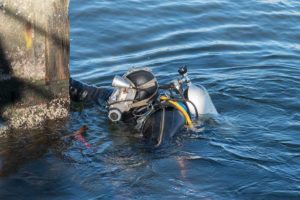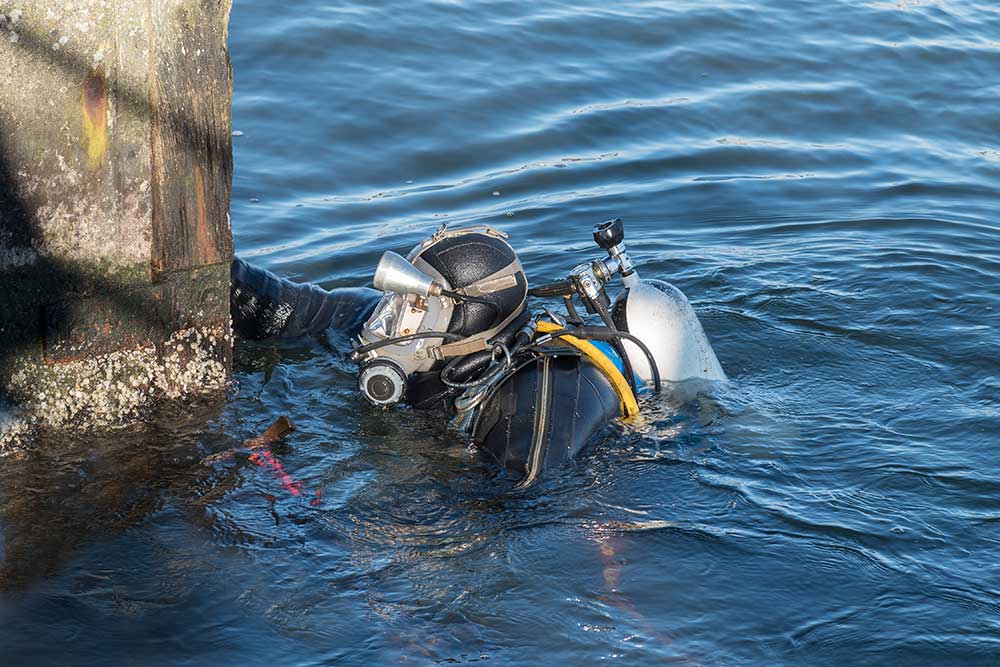Disclaimer: The information on our website is provided for general information purposes only. We make no representations or warranties of any kind, express or implied, about the completeness, accuracy, reliability, suitability or availability with respect to the website or the information contained on our website for any purpose. Any reliance on such information is therefore strictly at your own risk and we are not liable for any damages or losses arising out of or resulting from your reliance on any information contained on our website.
A commercial diver works in a variety of underwater settings such as deep seas, lakes, or other submerged places. These divers may also specialize in a particular type of work, from gathering or finding evidence underwater for law enforcement to performing construction tasks underwater. For example, it could entail maintenance on parts of a submerged structure, such as oil rigs. Commercial divers almost always work in teams and may work closely with engineers.
How to Become a Commercial Diver
According to O*NET OnLine, most commercial divers surveyed held a post-secondary certification. However, some had earned an associate’s degree. When looking for a program, it’s best to find ones that also help with job placement. The Association of Commercial Diving Educators accredits many diving schools, though it is not required to attend these. These accredited programs often include hands-on training and courses in safety, physics, lightweight, rigging, hazmat, underwater welding, deep dives, medicine, salvage, scuba, and hydraulics, to mention a few.
Besides this training, commercial divers also have to earn a TWIC card and pass a physical. A commercial diver usually begins their career as a diver’s assistant (called tenders) to gain experience for a few years before diving professionally. Once hired, you will receive a lot of additional on-the-job training. Employers prefer applicants with some mechanical skills such as welding or motor repair due to the nature of the job. It is also crucial to be a problem solver, think clearly during stressful situations, and be a team player. Watch a video to learn what a commercial diver does:
Job Description of a Commercial Diver

Commercial diver duties vary significantly from job to job, depending on the type of work required. This can include repairs, inspections, and maintenance for off-shore oil rig and pipelines, salvage operations, bridge and pier construction, power plant intake and discharge construction, ship and barges, dam construction, scientific study, emergency response, investigation and recovery operations, water agriculture and seafood harvesting. As one can see, each may require a different skill set pending on what you are doing. Some tasks require welding, conducting tests or experiments, rig explosives, or even photographing structures or marine life.
When a commercial diver works in deeper waters, they wear specialized wet suits when diving. When not diving, they assist the next team of divers from the boat. A diver submerged in deep seas must be placed in a decompression chamber to avoid decompression sickness. Besides, wearing a specialized diving suit, it is vital to following safety rules at all times as this job can be dangerous if one is careless.
Occupational Safety and Health Administration and the Coast Guard can monitor and assist in the safety of those employed in this kind of work. Commercial divers are exposed to dangerous environments every day and can get injured or worse, die due to accidents. Drowning, respiratory or circulatory risks, hypothermia, and physical injury can occur. Some jobs require living on ships for extended periods and may involve lots of travel while other tasks are for much shorter lengths of time and would be closer to home. This career may pay sporadically depending on the time spent on a job, and conditions may not always be pleasant, as mentioned above.
Benefits of being a Commercial Diver
Commercial divers benefit from a high demand for their specialized skills, ensuring a wealth of job opportunities. They relish the outdoor work environment, away from the confines of an office, often immersing themselves in the vastness of oceans and rivers, embarking on thrilling adventures as part of their daily routine. Proficient problem solvers, commercial divers utilize unique tools and apply their craft skills to overcome challenges in their field. Some divers engage in crucial environmental work, such as repairing broken oil pipes, contributing to the protection of our planet’s ecosystems. Additionally, many employers offer competitive salaries and comprehensive benefits, making the profession not only exciting but also financially rewarding and stable.
Commercial Diver Career Video Transcript
Commercial diving is a profession that in many cases, combines construction with scuba diving. These divers work on installations that cannot be removed from the water for servicing, such as oil rigs, bridges, and pipelines. They use construction tools such as welders and saws, in combination with scuba equipment, to perform maintenance and repair installations that are either partially or totally submerged in water. Divers may also perform other underwater work such as photographing marine wildlife or rigging explosives. They often work long days and typically spend weeks at sea on a job.
Commercial diving can be both strenuous and dangerous, as it combines the risks inherent in construction work with the added complication of being underwater, sometimes working with or around explosives and volatile materials. Typical requirements to enter the field include a high school education, proficiency in English, a certificate from a diving school, and passing a physical. Mechanical abilities and strong swimming skills are helpful. Commercial diving offers both physical and mental challenges, but the work is often exciting and the pay can be lucrative.
Article Citations
National Center for O*NET Development. 49-9092.00. O*NET OnLine.

